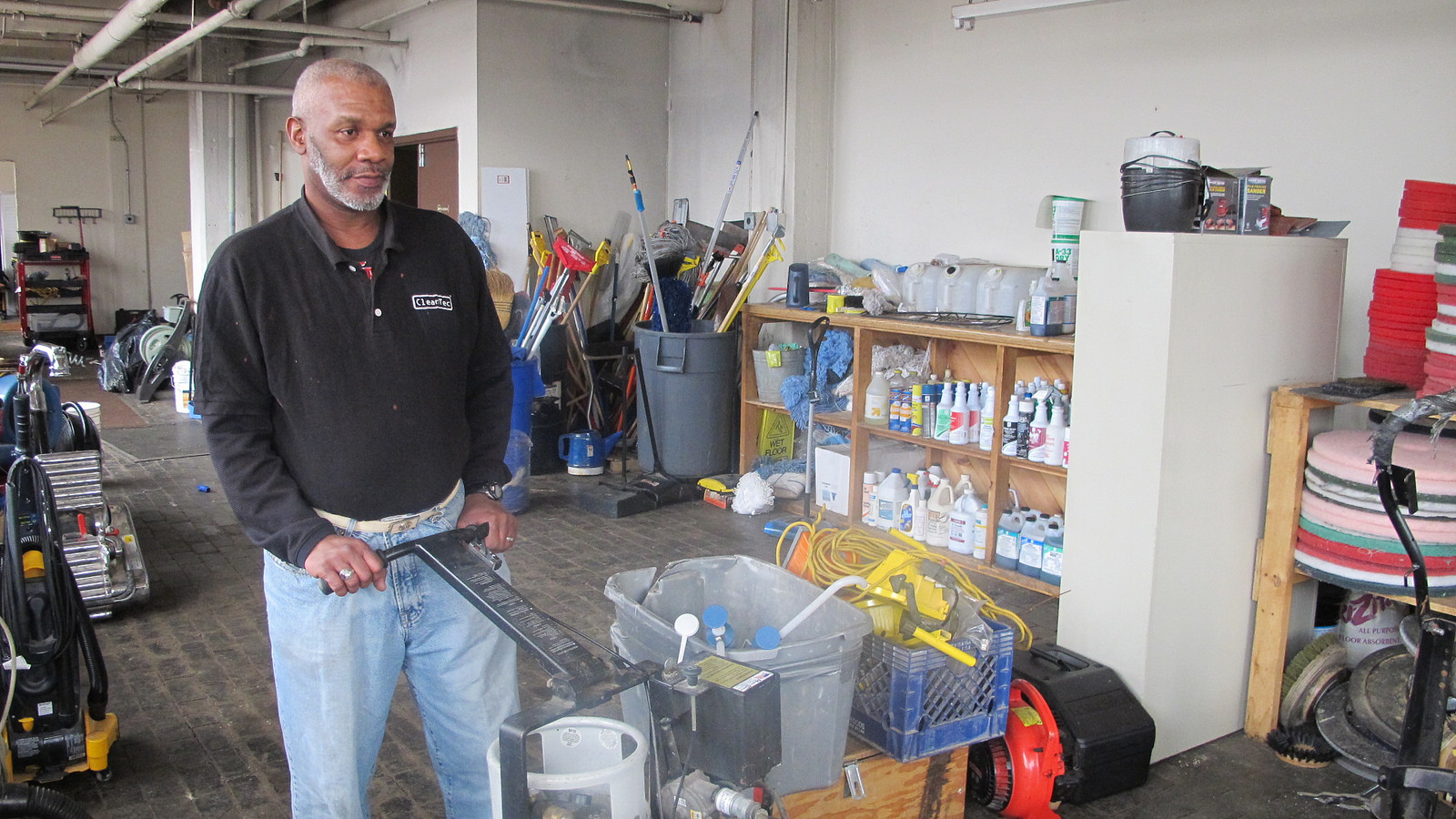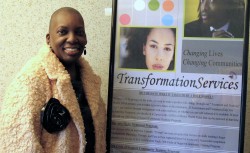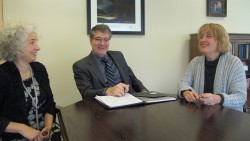Program Helps Train Urban Business Owners
Small Business Administration's "street-wise" MBA trains people to run their own businesses.

Ondra Stovall, CleanTec lead man since 2009, prepares to take cleaning equipment from the company’s storage room to a commercial client’s site. (Photo by Andrea Waxman)
Although Ingrid Hicks has run Transformation Services, Inc. since 2007, she just recently learned that hiring a certified public accountant would greatly enhance her chances of winning a city contract. Upgrading from a bookkeeper was not something she had considered before participating in a 26-week program for small business owners.
“If we don’t get (the contract), it won’t be because we didn’t have the staff or we didn’t put our best foot forward. It will be because of something that is beyond our control,” Hicks said.
“Small businesses are job creators and we want to give them an opportunity to work on their businesses, rather than just in their businesses,” said Eric Ness, SBA district director.
Taught by Gene Wright, the director of the Lubar Executive MBA program at UW Milwaukee, the initiative provides “the organizational framework, resource network, and motivation required to build sustainable businesses and promote the economic development within urban communities,” the Web site says.

Dr. Ingrid Hicks, CEO of Transformation Services, Inc. in a training room at her company. (Photo by Andrea Waxman)
The initiative offers classes one evening every other week and brings in experts that focus on business and strategic assessment; financial management; sales and marketing; resources (human resources and accessing capital and markets); and developing a three-year growth plan. On alternate weeks, participants meet informally in “CEO Roundtables.” In groups of three or four, they talk with other small-business owners about their problems and about issues that come up in class, explained Ness.
Called “a street-wise MBA program,” the initiative is designed to give participants new skills and perspectives to help them run their businesses, according to Shirah Rachel Apple, SBA public information officer. But unlike academic MBA programs, which often examine Harvard case studies, the cases studied here are the businesses that participants are running. “They’re bringing in the problems that they need to work on,” Ness said.
The SBA pays participants’ tuition to Interise, the company that developed the curriculum. The SBA launched the initiative in 2008 in 10 U.S. cities including Milwaukee. Last year, it was offered in 27 cities and in 2015 it will expand to 48 cities.
This year, the SBA added the Emerging Leaders Graduate Institute of Learning, a series of 15 two-hour webinars that develop and review each of the topics covered in the program, said Mary Trimmier, lead economic development specialist at the SBA’s Milwaukee district.
Hicks, who has been a psychologist for 30 years, said she knew that the only way she could grow her business was to learn certain basic business principles that she felt she lacked.
Transformation Services, Inc., 835 N. 23rd St., provides alcohol and other drug treatment as well as drug counselor training and licensing. Addicts who complete a 90-day course of treatment and remain drug-free for another 90 days are eligible to enter a training program that leads to a substance abuse counselor-in-training license.
The company also offers training for professionals, individuals who need continuing education hours to maintain or improve upon their licenses, people getting out of the military and those who are interested in getting into another profession, Hicks said.
Expanded network
Charles Carter, founder of CleanTec, 2821 N. 4th St., a four-year-old commercial cleaning business, had a small network, “mainly industry-related or relatives,” he said. But this year, through the Emerging Leaders Initiative, he connected to a broader group of CEOs working in a wide range of industries.
Carter said that he enjoyed the opportunity to interact with other business owners, whose stories were so similar to his own, and learn best practices.
He also learned about social media tools to boost his marketing efforts, and gained financial planning skills. Financial institution representatives helped him understand what he had to do to get loans, he said. Government representatives who talked about purchasing and doing business with the government were also helpful. As a result, Carter registered CleanTec with the System for Award Management, the portal for doing business with the federal government, he added.

Small Business Administration staff, (from left) Shira Rachel Apple, public information officer; Eric Ness, district director; and Mary Trimmier, lead economic development specialist share a light moment in their offices at the Reuss Federal Plaza. (Photo by Andrea Waxman)
Forcing him to focus on his business and giving him new ideas, concepts and resources were all benefits, Carter noted. He is taking advantage of the graduate webinar series, he said and added, “If they ever come up with a part two, sign me up because it helped me and my business tremendously.”
Magic Maintenance founder and owner Guillermo Montoto Garza agreed. “Being able to share ideas … and learn about marketing, financials and human resources were all valuable,” he said. Magic Maintenance is located at 1000-04 W. National Ave.
Montoto Garza, whose company primarily focuses on facility maintenance, such as changing motors and belts and working on fans in HVAC systems, found the initiative through an online article. “I always try to stay on top of whatever trainings are available,” he said.
Ness noted that the SBA has a number of partners in the initiative, including Milwaukee County’s Community Business Development Partners, City of Milwaukee, Wisconsin Women’s Business Initiative Corporation, SCORE, Greater Milwaukee Committee, UWM’s Wisconsin Small Business Development Center, Wisconsin Economic Development Corporation, Wisconsin Business Development Finance Corporation and the Metropolitan Milwaukee Sewage District, which hosts the program at its headquarters at 260 W. Seeboth St.
“It’s a great opportunity when folks have a business that’s up and running … [to] work with another group of folks to put their growth plan together,” Ness said. “One of my highlights of the year is to sit down and listen to what these businesses have accomplished over the 26 weeks.”
The SBA’s Milwaukee district will offer the initiative again for the eighth year in 2015. It is currently accepting applications for a class beginning in April. There is no cost to participants. CEOs of businesses that have been operating for at least three years, and have at least one other employee and $300,000 or more in revenue can apply online or contact the SBA Milwaukee district office.
In addition to providing opportunities to talk through and ask questions about business issues, Hicks said, the initiative facilitated her connection to U.S. senators and representatives who agreed to support her efforts to get federal contracts.
Hicks said, “I didn’t know prior to the class where to go [for help with my business]. I never felt that I had an ally or an ongoing support system like [I do] with the SBA.”
This story was originally published by Milwaukee Neighborhood News Service, where you can find other stories reporting on fifteen city neighborhoods in Milwaukee.





















I am a small business owner that could greatly benefit from knowledge that will help me grow my business. Can someone please call me at 414-690-0672 so I can find out how to get involved in “streetwise”